人教版八年级上册英语 Unit 7 Will people have robots? Section A Grammar focus-3c 课件 (共19张PPT)
文档属性
| 名称 | 人教版八年级上册英语 Unit 7 Will people have robots? Section A Grammar focus-3c 课件 (共19张PPT) | 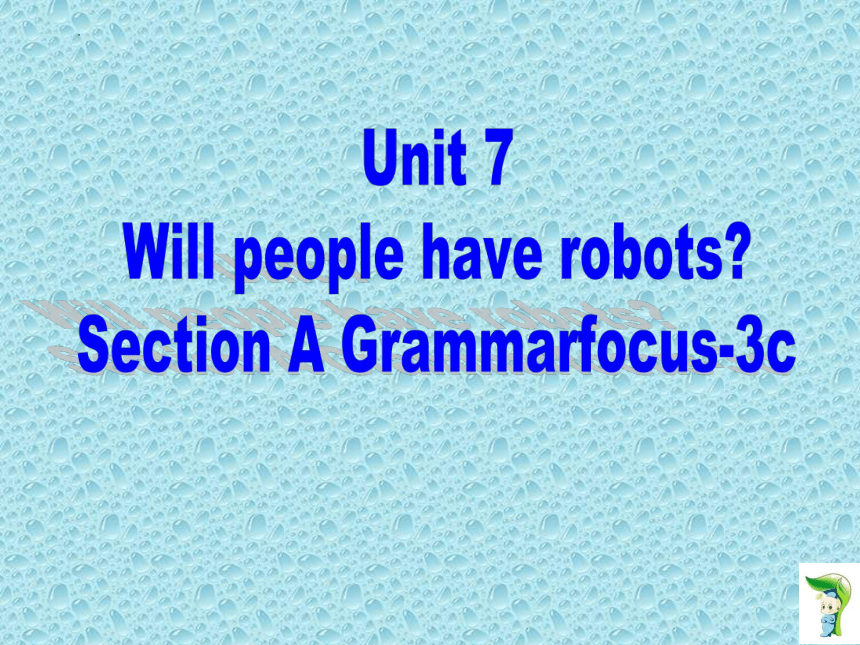 | |
| 格式 | zip | ||
| 文件大小 | 590.9KB | ||
| 资源类型 | 教案 | ||
| 版本资源 | 人教新目标(Go for it)版 | ||
| 科目 | 英语 | ||
| 更新时间 | 2022-08-14 18:58:48 | ||
图片预览

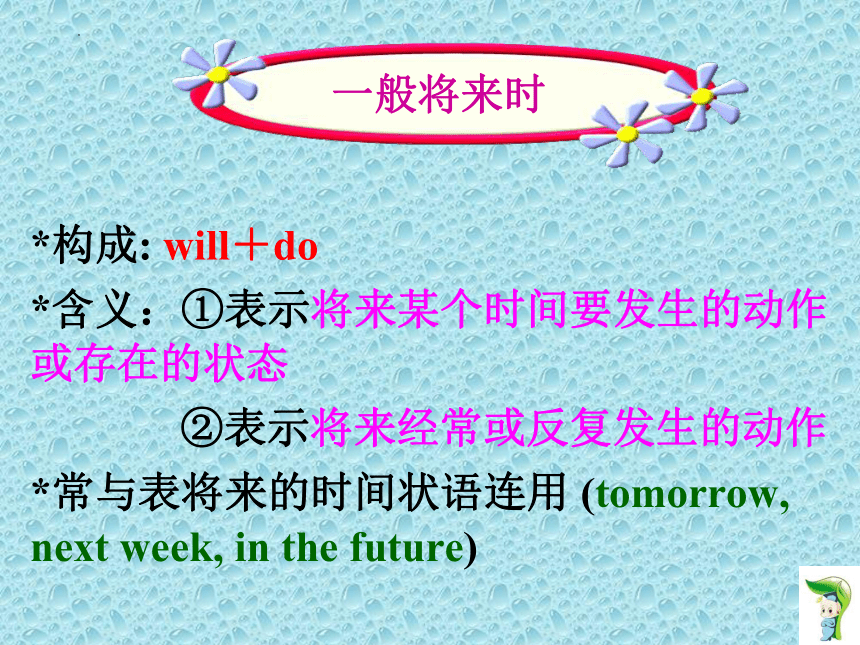
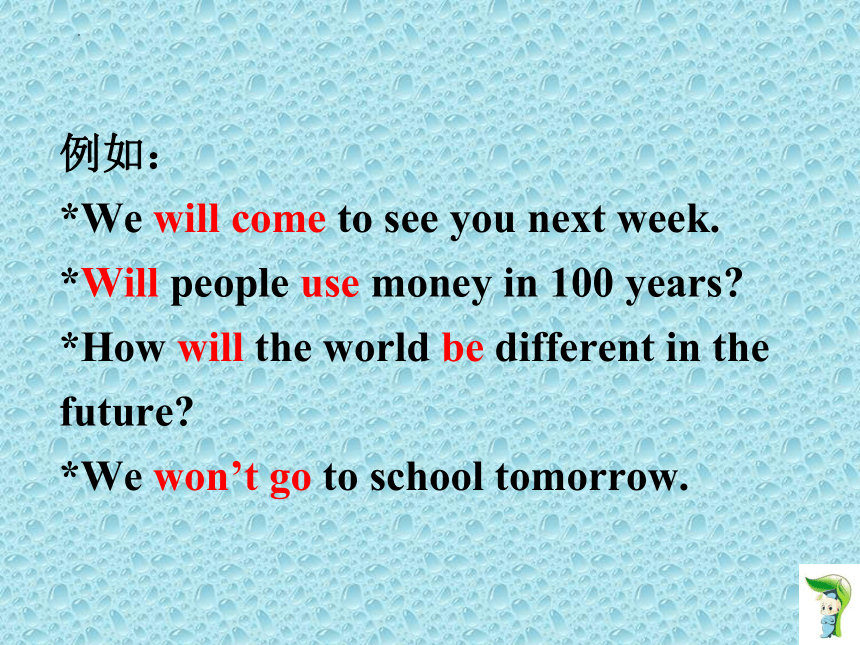
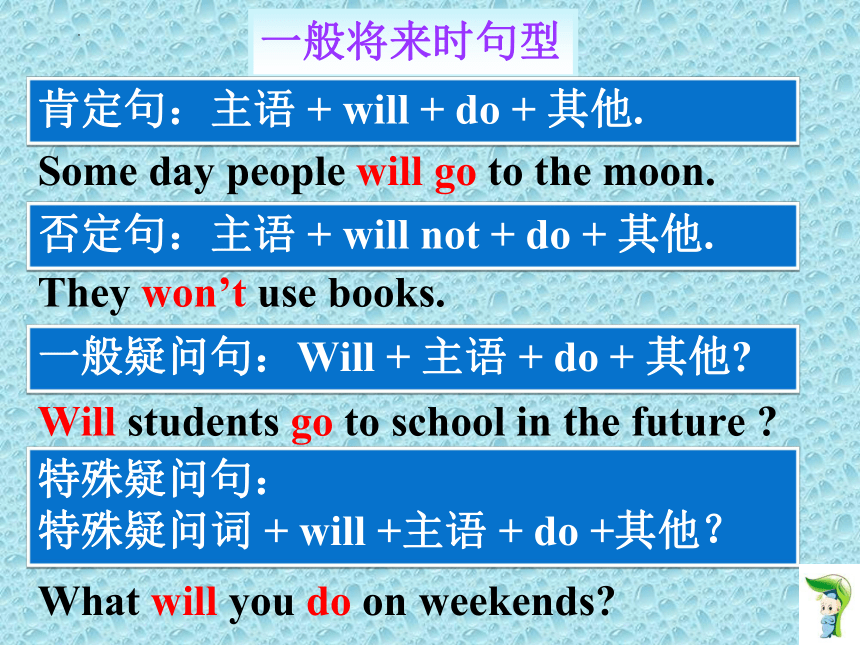
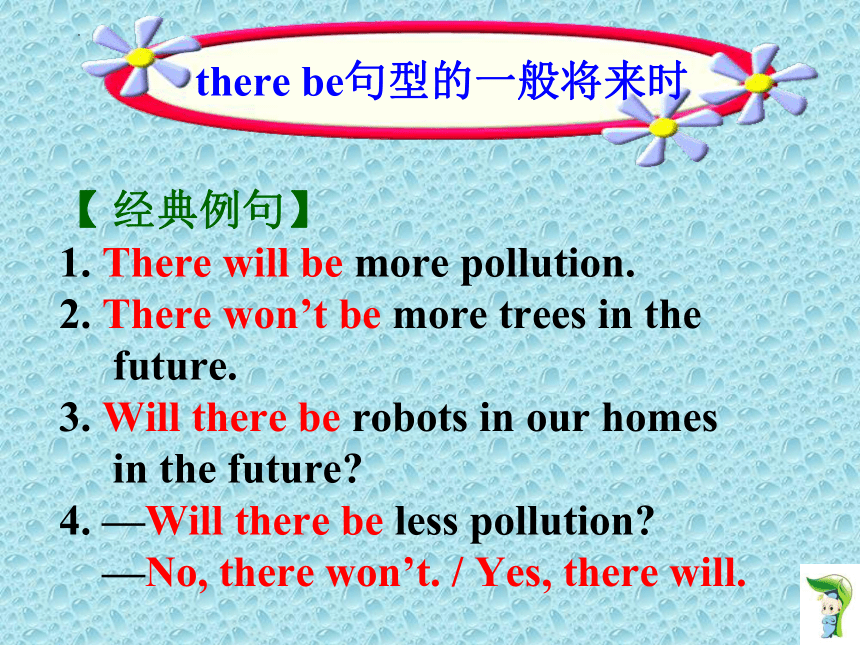
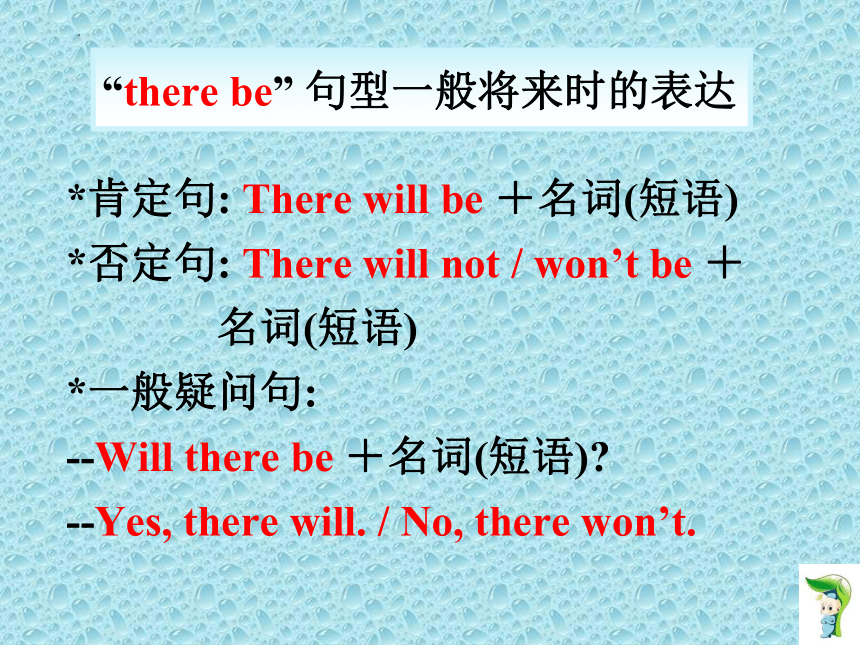
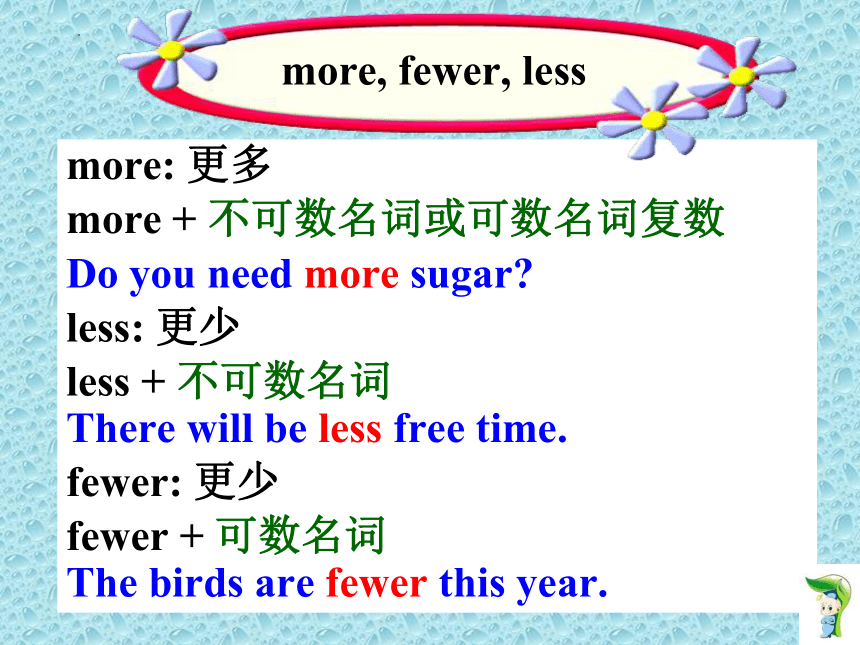
文档简介
(共19张PPT)
Unit 7
Will people have robots
Section A Grammarfocus-3c
*构成: will+do
*含义:①表示将来某个时间要发生的动作或存在的状态
②表示将来经常或反复发生的动作
*常与表将来的时间状语连用 (tomorrow, next week, in the future)
一般将来时
例如:
*We will come to see you next week.
*Will people use money in 100 years
*How will the world be different in the
future
*We won’t go to school tomorrow.
Some day people will go to the moon.
一般将来时句型
肯定句:主语 + will + do + 其他.
否定句:主语 + will not + do + 其他.
一般疑问句:Will + 主语 + do + 其他
They won’t use books.
Will students go to school in the future
特殊疑问句:
特殊疑问词 + will +主语 + do +其他?
What will you do on weekends
【 经典例句】
1. There will be more pollution.
2. There won’t be more trees in the
future.
3. Will there be robots in our homes
in the future
4. —Will there be less pollution
—No, there won’t. / Yes, there will.
there be句型的一般将来时
“there be” 句型一般将来时的表达
*肯定句: There will be +名词(短语)
*否定句: There will not / won’t be +
名词(短语)
*一般疑问句:
--Will there be +名词(短语)
--Yes, there will. / No, there won’t.
more: 更多
more + 不可数名词或可数名词复数
Do you need more sugar
less: 更少
less + 不可数名词
There will be less free time.
fewer: 更少
fewer + 可数名词
The birds are fewer this year.
more, fewer, less
Practice
1. We will watch a football match this
evening. (改为一般疑问句并作肯定回答)
--Will you watch a football match this evening
--Yes, we will.
2. She will go shopping tomorrow.
(改为否定句)
She won’t go shopping tomorrow.
3. The students will go on a trip in five days.
(对划线部分提问)
What will the students do in five days
4. There will be less pollution.
(改为一般疑问句并作肯定回答)
--Will there be less pollution
--Yes, there will.
5. There will be more trees in the future.
(改为一般疑问句并作否定回答)
--Will there be more trees in the future
--No, there won’t.
3a
Fill in the blanks with more, less or fewer.
(P 51)
In the future, there will be _____ fresh water because there will be ______ pollution in the sea.
2. In 100 years, there will be_______ cars because there will be ______ people in the cities.
3. There will be_______ jobs for people
because_______ robots will do the same jobs
as people.
4. I think there will be _____ cities because people will build _____ buildings in the country.
5. In 50 years, people will have _____ free time because there will be _____ things to do.
less
more
more
more
fewer
more
more
more
less
more
Complete the predictions with what you
think will happen. (P 51)
Kids study at school now. In 100 years,
___________________________________
2. I sometimes see blue skies in my city, but
in the future ________________________
___________________________________
kids will study at home on computers.
I will often see the blue skies,
because there will be less pollution.
3b
4. Families usually spend time together on
weekends, but maybe in 200 years______
___________________________________
___________________________________
3. People now usually live to be about 70-80
years old, but in the future
____________________________________
people will live to be 200 years old.
every day can be weekends, because
they have robots to do everything.
汉译英。
1. 将来会有越来越多的电影院吗?
2. --你认为他五年后会成为什么?
--我想他会成为一个医生。
Will there be more and more cinemas
--What do you think he will be in five years
--I think he’ll be a doctor.
3. 明天在我们学校有一场足球赛。
4. 今天下午会议室里不放电影。
There will be a football match in our school tomorrow.
There won’t be a film in the meeting room this afternoon.
1) I ______(fly) rockets to the moon when I grow up.
2) We _________(have) robots in our homes in 100 years.
3) My uncle __________(come) to Beijing next week.
4) We _________(use) money in 100 years.
5) Kids _________(go) to school in the future.
will fly
will have
will come
won’t use
won’t go
A: Will people live to be 200 years old
B: Yes, they ____.
A: ____they ____ money in 100 years
B: No, they won’t.
A: Will you go out tomorrow
B: No, _______.
will
Will
use
I’ll not
A: What ___ the future ___ like
B: Cities ______ more crowded and polluted.
A: What will your life be like in ten years
B: I think ______ an astronaut.
A: Where will you live
B: I ______ on a space station.
A: When ____ she ___ for London
B: She’ll leave next Sunday.
will
be
will be
I’ll be
will live
will
live
1. 一般将来时句型如下:
1) 肯定句:
主语 + will + do +其他.
2) 否定句:
主语 + will not + do +其他.
3) 一般疑问句:
--Will +主语+ do +其他?
4) 特殊疑问句:
特殊疑问词 + will +主语 + do +其他?
Review
课时重点回顾
2. “there be” 句型一般将来时的表达
*肯定句: There will be +名词(短语)
*否定句: There will not / won’t be +
名词(短语)
*一般疑问句:
--Will there be +名词(短语)
--Yes, there will. / No, there won’t.
3. more, less, fewer
Unit 7
Will people have robots
Section A Grammarfocus-3c
*构成: will+do
*含义:①表示将来某个时间要发生的动作或存在的状态
②表示将来经常或反复发生的动作
*常与表将来的时间状语连用 (tomorrow, next week, in the future)
一般将来时
例如:
*We will come to see you next week.
*Will people use money in 100 years
*How will the world be different in the
future
*We won’t go to school tomorrow.
Some day people will go to the moon.
一般将来时句型
肯定句:主语 + will + do + 其他.
否定句:主语 + will not + do + 其他.
一般疑问句:Will + 主语 + do + 其他
They won’t use books.
Will students go to school in the future
特殊疑问句:
特殊疑问词 + will +主语 + do +其他?
What will you do on weekends
【 经典例句】
1. There will be more pollution.
2. There won’t be more trees in the
future.
3. Will there be robots in our homes
in the future
4. —Will there be less pollution
—No, there won’t. / Yes, there will.
there be句型的一般将来时
“there be” 句型一般将来时的表达
*肯定句: There will be +名词(短语)
*否定句: There will not / won’t be +
名词(短语)
*一般疑问句:
--Will there be +名词(短语)
--Yes, there will. / No, there won’t.
more: 更多
more + 不可数名词或可数名词复数
Do you need more sugar
less: 更少
less + 不可数名词
There will be less free time.
fewer: 更少
fewer + 可数名词
The birds are fewer this year.
more, fewer, less
Practice
1. We will watch a football match this
evening. (改为一般疑问句并作肯定回答)
--Will you watch a football match this evening
--Yes, we will.
2. She will go shopping tomorrow.
(改为否定句)
She won’t go shopping tomorrow.
3. The students will go on a trip in five days.
(对划线部分提问)
What will the students do in five days
4. There will be less pollution.
(改为一般疑问句并作肯定回答)
--Will there be less pollution
--Yes, there will.
5. There will be more trees in the future.
(改为一般疑问句并作否定回答)
--Will there be more trees in the future
--No, there won’t.
3a
Fill in the blanks with more, less or fewer.
(P 51)
In the future, there will be _____ fresh water because there will be ______ pollution in the sea.
2. In 100 years, there will be_______ cars because there will be ______ people in the cities.
3. There will be_______ jobs for people
because_______ robots will do the same jobs
as people.
4. I think there will be _____ cities because people will build _____ buildings in the country.
5. In 50 years, people will have _____ free time because there will be _____ things to do.
less
more
more
more
fewer
more
more
more
less
more
Complete the predictions with what you
think will happen. (P 51)
Kids study at school now. In 100 years,
___________________________________
2. I sometimes see blue skies in my city, but
in the future ________________________
___________________________________
kids will study at home on computers.
I will often see the blue skies,
because there will be less pollution.
3b
4. Families usually spend time together on
weekends, but maybe in 200 years______
___________________________________
___________________________________
3. People now usually live to be about 70-80
years old, but in the future
____________________________________
people will live to be 200 years old.
every day can be weekends, because
they have robots to do everything.
汉译英。
1. 将来会有越来越多的电影院吗?
2. --你认为他五年后会成为什么?
--我想他会成为一个医生。
Will there be more and more cinemas
--What do you think he will be in five years
--I think he’ll be a doctor.
3. 明天在我们学校有一场足球赛。
4. 今天下午会议室里不放电影。
There will be a football match in our school tomorrow.
There won’t be a film in the meeting room this afternoon.
1) I ______(fly) rockets to the moon when I grow up.
2) We _________(have) robots in our homes in 100 years.
3) My uncle __________(come) to Beijing next week.
4) We _________(use) money in 100 years.
5) Kids _________(go) to school in the future.
will fly
will have
will come
won’t use
won’t go
A: Will people live to be 200 years old
B: Yes, they ____.
A: ____they ____ money in 100 years
B: No, they won’t.
A: Will you go out tomorrow
B: No, _______.
will
Will
use
I’ll not
A: What ___ the future ___ like
B: Cities ______ more crowded and polluted.
A: What will your life be like in ten years
B: I think ______ an astronaut.
A: Where will you live
B: I ______ on a space station.
A: When ____ she ___ for London
B: She’ll leave next Sunday.
will
be
will be
I’ll be
will live
will
live
1. 一般将来时句型如下:
1) 肯定句:
主语 + will + do +其他.
2) 否定句:
主语 + will not + do +其他.
3) 一般疑问句:
--Will +主语+ do +其他?
4) 特殊疑问句:
特殊疑问词 + will +主语 + do +其他?
Review
课时重点回顾
2. “there be” 句型一般将来时的表达
*肯定句: There will be +名词(短语)
*否定句: There will not / won’t be +
名词(短语)
*一般疑问句:
--Will there be +名词(短语)
--Yes, there will. / No, there won’t.
3. more, less, fewer
同课章节目录
- Unit 1 Where did you go on vacation?
- Section A
- Section B
- Unit 2 How often do you exercise?
- Section A
- Section B
- Unit 3 I'm more outgoing than my sister.
- Section A
- Section B
- Unit 4 What's the best movie theater?
- Section A
- Section B
- Unit 5 Do you want to watch a game show?
- Section A
- Section B
- Unit 6 I'm going to study computer science.
- Section A
- Section B
- Unit 7 Will people have robots?
- Section A
- Section B
- Unit 8 How do you make a banana milk shake?
- Section A
- Section B
- Unit 9 Can you come to my party?
- Section A
- Section B
- Unit 10 If you go to the party, you'll have a grea
- Section A
- Section B
